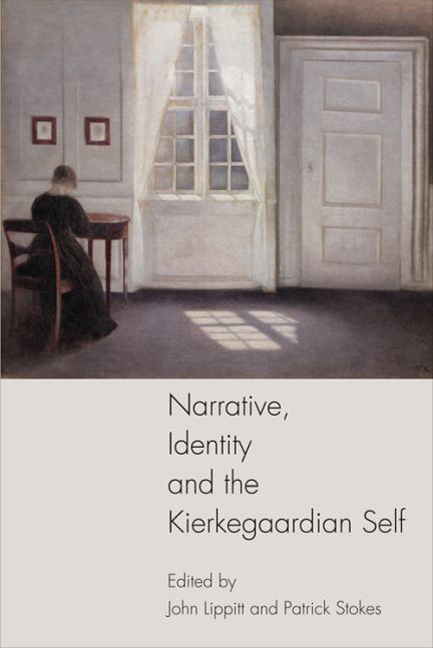Book contents
- Frontmatter
- Contents
- Acknowledgements
- Abbreviations
- Contributors
- Introduction
- 1 The Moments of a Life: On Some Similarities between Life and Literature
- 2 Teleology, Narrative and Death
- 3 Kierkegaard's Platonic Teleology
- 4 Narrative Holism and the Moment
- 5 Kierkegaard's Erotic Reduction and the Problem of Founding the Self
- 6 Narrativity and Normativity
- 7 The End in the Beginning: Eschatology in Kierkegaard's Literary Criticism
- 8 Forgiveness and the Rat Man: Kierkegaard, ‘Narrative Unity’ and ‘Wholeheartedness’ Revisited
- 9 The Virtues of Ambivalence: Wholeheartedness as Existential Telos and the Unwillable Completion of Narravives
- 10 Non-Narrative Protestant Goods: Protestant Ethics and Kierkegaardian Selfhood
- 11 Narrativity, Aspect and Selfhood
- 12 The Senses of an Ending
- 13 The End? Kierkegaard's Death and its Implications for Telling his Story
- Bibliography
- Index
4 - Narrative Holism and the Moment
Published online by Cambridge University Press: 15 September 2017
- Frontmatter
- Contents
- Acknowledgements
- Abbreviations
- Contributors
- Introduction
- 1 The Moments of a Life: On Some Similarities between Life and Literature
- 2 Teleology, Narrative and Death
- 3 Kierkegaard's Platonic Teleology
- 4 Narrative Holism and the Moment
- 5 Kierkegaard's Erotic Reduction and the Problem of Founding the Self
- 6 Narrativity and Normativity
- 7 The End in the Beginning: Eschatology in Kierkegaard's Literary Criticism
- 8 Forgiveness and the Rat Man: Kierkegaard, ‘Narrative Unity’ and ‘Wholeheartedness’ Revisited
- 9 The Virtues of Ambivalence: Wholeheartedness as Existential Telos and the Unwillable Completion of Narravives
- 10 Non-Narrative Protestant Goods: Protestant Ethics and Kierkegaardian Selfhood
- 11 Narrativity, Aspect and Selfhood
- 12 The Senses of an Ending
- 13 The End? Kierkegaard's Death and its Implications for Telling his Story
- Bibliography
- Index
Summary
NARRATIVE AND ANTI-NARRATIVE IN KIERKEGAARD
Personal identity theory is a rather odd sort of hybrid: born of philosophy of mind and metaphysics, with some pneumatology and soteriology a bit further back in the family tree, and eccentric uncle philosophy of religion living in the shed out the back (where the others let him potter around doing his own thing, hoping he'll eventually move out). When narrative theory married into this family, having been introduced in the 1980s via philosophy of history and through the dual tracks of MacIntyrean virtue ethics and Ricoeurian hermeneutics, it brought a much-needed infusion of ethics, value theory and philosophical psychology into the gene pool. While ethically neutral, purely metaphysical ways of discussing selfhood are still very much with us, narrativists such as MacIntyre, Ricoeur, Charles Taylor, Marya Schechtman and David Carr have done much to refocus our attention on the practical and ethical concerns that propel questions about personal identity. Practical identity has increasingly come to be seen as fundamental to, rather than supervenient upon, what we essentially are. This shift wasn't wholly down to narrativists – other theorists of practical identity, such as Korsgaard, were also central to this process – but a definite ‘narrative turn’ has occurred, whereby narrative, as that by which we ‘emplot’ our practical identities and unify our experiences and projects into an internally coherent, diachronically-extended whole, has increasingly come to be viewed as centrally important for understanding the ways in which we negotiate our way through temporality.
At the same time, the last decade or so of Kierkegaard scholarship, particularly the work of John Davenport and Anthony Rudd, has demonstrated that Kierkegaard – and particularly Judge Wilhelm in the second volume of Either/Or – has useful things to say to the narrative self-constitution view, whether we ultimately accept that view or not. Kierkegaard's claim that each of us has the task of acquiring his or her self in the form of a history (like the German Geschichte, the Danish historie can mean either ‘history’ or ‘story’), and the account of how that acquisition takes place via self-consolidating choices out of the immediacy of drives and dispositions and the self-conscious adoption of projects, are a mine of theoretical and phenomenological insights for narrativists.
- Type
- Chapter
- Information
- Narrative, Identity and the Kierkegaardian Self , pp. 63 - 77Publisher: Edinburgh University PressPrint publication year: 2015

